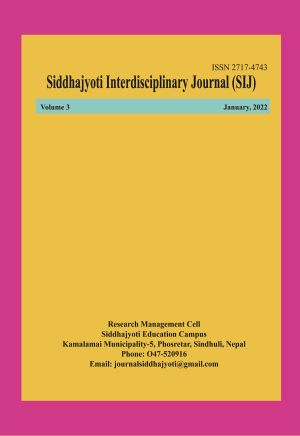Teacher benchmarking: In the context of university concerning Nepal
DOI:
https://doi.org/10.3126/sij.v3i1.46282Keywords:
Level of qualification, Pedagogical knowledge, Professional skills and knowledge, Teaching competenciesAbstract
The purpose of this paper is to explore the practices of benchmarking teacher competencies in the higher educational institutions in Nepal. The amalgamated paper reviews on practices of benchmarking for Higher Education (HE) teachers among different institution(s) in Nepal; and finds teacher’s professional skills, levels of formal qualification of teachers including content knowledge, professional aspiration, developing a thirst for innovations, and 21st -century teaching skills and its transference to learners as accepted areas to define their competencies. Subsequent exploration of practices, experiences of engaged professionals helped us to define the reality that enables the teacher to enter HE services in Nepal. The study reveals all Universities have set criterion to be fulfilled to enter HE teaching that includes; minimum formal academic years of learning (degree), professional experiences including publications (evidence), and required content knowledge and pedagogical skills (audited through an exam). In addition, ‘acceptance’ among students and higher social capital the ‘political linkage were two non-specified areas with noted privilege for the candidate to join University teaching. These insights signal the need for a concisely defined competency framework for a conflict-free community of practice.
Downloads
Downloads
Published
How to Cite
Issue
Section
License
This license enables reusers to distribute, remix, adapt, and build upon the material in any medium or format for noncommercial purposes only, and only so long as attribution is given to the creator.

